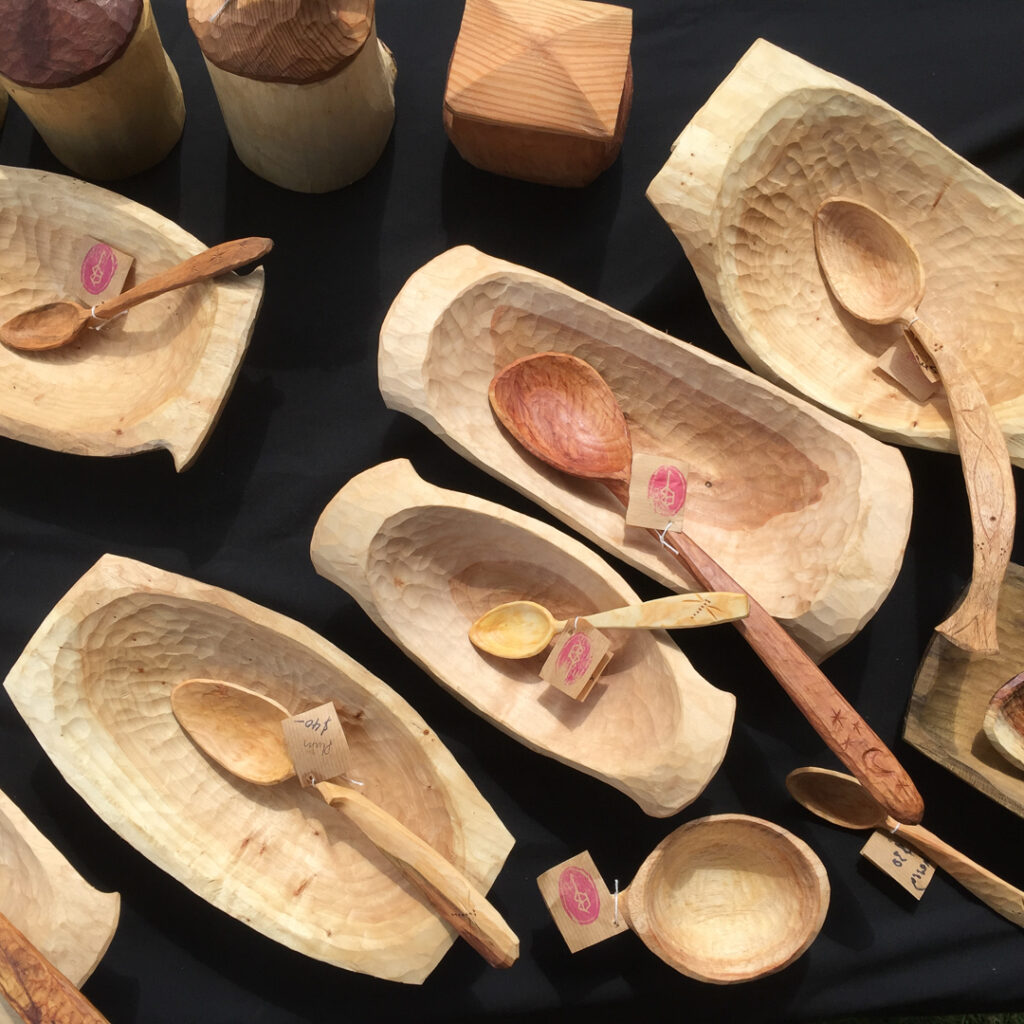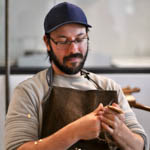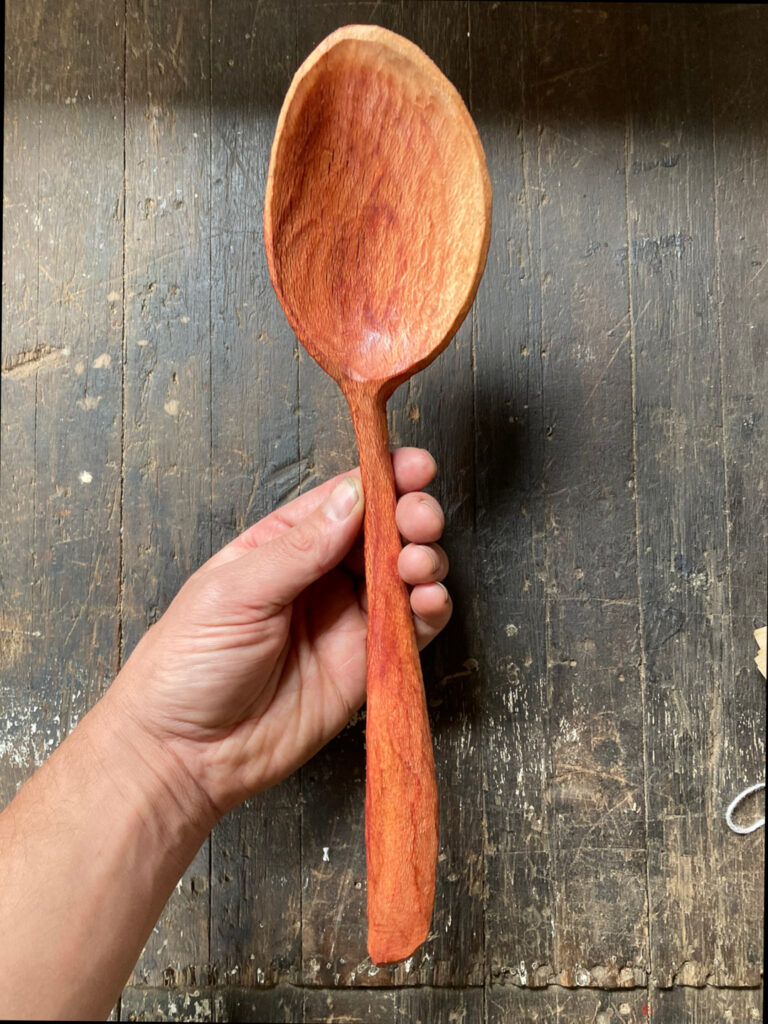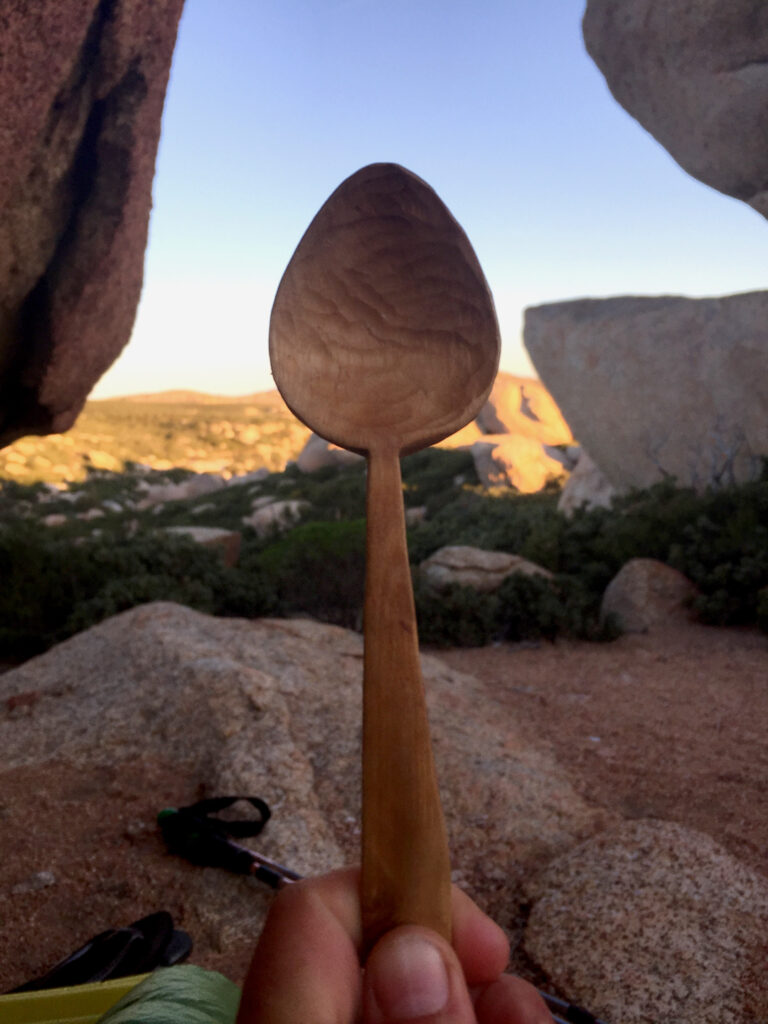
Eli Beke, Spoons and Bowls, Wood in Birch Native Cherry Nectarine and Hickory Wattle, Various Sizes 2021; photo: Eli Beke
Eli Beke explains why he makes tableware from wood, as a way of “making special”.
(A message to the reader.)
“To make special the taste of our food, wooden wares and the stories made.”
When touching wood, it is warm and comforting to me. The wear and patina form a beauty of usage over years that smooth its crisply carved facets. Wood ages as we all do. Timber is neither hard nor glassy, not being shaped from fired vitrified earths then made fragile. Wood yields and bends rather than shattering when dropped by accident from the hand. Wooden crafted tableware and kitchenware instead rebound from the floor and continue to share in our meals working either as a daily duty or accompaniment to our special occasions. Wooden wares in our current epoch are making special the taste of our food and the stories we make.
I am a wood carver. I have been practising carving wooden homewares seriously for seven years, with thousands of pieces being passed on to new owners. Each time I make a piece, I am performing a well-rehearsed dance of tools, hand and intellect. A distinct set of movements are applied to each spoon that solves the problems of the form, design and physical composition.
Seated at the doors to my workshop, the sun shines on a crisp melody of chips being liberated using sharp tool edges from wood as I sculpt a piece. Each chip is carved out under my constant scrutiny and any wavering attention would show. I seek to achieve a balanced, pleasing, practicable piece. For my work, I need to observe the wood as it is shaped and anticipate where the next chip is to be liberated, then so on, up to the final chip. I know with certainty after a final chip has been carved that I am ready for a piece to be finished and leave my hands.
A piece crafted by me passes to the hands of another who sees its value. No longer is it my spoon or my piece, it belongs to them and their story. There are stories of everyday cooking. Stories of bringing a familial group to the well-scrubbed table. Being seated aside and opposite known and loved people of warm countenance we pass from dish to plate a shared experience of taste. Serving and sharing a well-crafted meal brings us into the future together. Our bonds are made stronger by shared ritual and experience.
There are stories also of taking a long walk, then cooking and eating from the hiker’s pot with a birch wood spoon, shaped to fit neatly inside the pot as it traverses peak and valley on the owner’s back. Dipping the spoon into the simmering food and bringing the cooked from the bottom to mix with the cooking portion at the top of a long day’s work is rewarded by a hot meal that is not ready soon enough.
Among the sweetest rewards is to eat when famished from a day of work under a clear broad sky where the crickets have something to say that harmonises well with taking rest from exertion. The shadow of the earth has begun creeping above the horizon as the bush sways and nods stimulated by a gentle breeze. Held by its smoothed handle, a spoon bowl comprised of familiar smooth timber edges and facets that were formed by the contours of the sharp-edged tool. The spoon’s carved bowl is coloured and patinated by meals past, conferring some part of its story. Such a spoon fits well in the hand, comfortable, warm and well-known. Generously scooping and carrying each morsel of the food mountain in the hiker’s pot. Each bite passes through a cooling breath on its way to becoming part of you.
“Making special” as applied by humans in their behaviour is detailed by Ellen Dissanayake in her book What is art for? She describes “making special” as a worldwide cultural proclivity to actively enhance either physical objects or events. Some well-versed practitioners of “making special” from among my wooden ware clients are Zoe Birch and Lachlan Gardner, the creative minds behind Greasy Zoes, an 8-seater fine dining establishment in Hurstbridge, Victoria, Australia. “We were a bit burnt out and embittered after working for other people a long time in hospitality” states Zoe. “We had the option to lease and operate a small venue and make it an extension of our home. The wine we serve is the wine we drink. The records we play are the ones we love. The art on the walls; the food we cook; the wares it’s served on are all made or grown by people we know personally and within 100km.” Their little restaurant is first and foremost a place in which they want to spend time creating together.
Each aspect of Greasy Zoes is carefully thought out and attended to. The pacing of Lachlan and Zoe’s art flows from casual food to be eaten with the fingers, transitioning to knives and forks then rising to a peak of a main course followed by a croissant and cheese crafted in-house as a sweet savoury dessert. They aim for people to leave their worries at the door and engage with them. An intimate eight-person dining experience means dining strangers frequently leave as friends. Diners may get an earthy mushroom dish served with a hand-carved wooden spoon or finger food served high on wooden pedestal trenchers. “I think a lot about each dish and how it fits into the whole experience, how to pair the food with the right tableware to best share it” ends Zoe.
Handmade wooden tableware and minimal possessions were the realities of times past. Everyone had their bowl and their spoon and not much more in the way of tableware. Brightly painted china and silvered steel was the province of the few. Novelty and scarcity partly drive what can be considered suitable for making special experiences. Post the industrial revolution, we all have drawers overflowing with items; items that for myself I feel a minimal connection to. They are made in factories every day. They are easy to replace, except that which I have modified or has an emotional connection to another: perhaps a carved replacement native cherry handle for a broken spatula or a sentimental pot from a kindly remembered relative. If I am crafting a meal for the loves in my life, I will reach for my best wares.
We make special to come together, to share our joy with others and entice them to joy. We want our food to taste good and it tastes best when it is made special and remembered as a story we enjoyed being a part of making.
About Eli Beke

Eli currently resides in Djilang (Geelong) and sites his studio in Torquay on Wadawurrung Country. He regularly offers greenwood spoon carving learning opportunities in Naarm (Melbourne) or by appointment in Torquay and is developing larger sculptural and functional works. Raised in Naarm (Melbourne); he trained initially in Engineering whilst his extensive travels across Asia by bicycle and study of greenwood spoon carving also inform his work and practice. Visit www.wedgeandedge.com, email wedgeandedgewood(@)gmail.com and follow @wedge_edge
“First and foremost it is the joy and connection that other people feel when they encounter my work that keeps me making it.”



